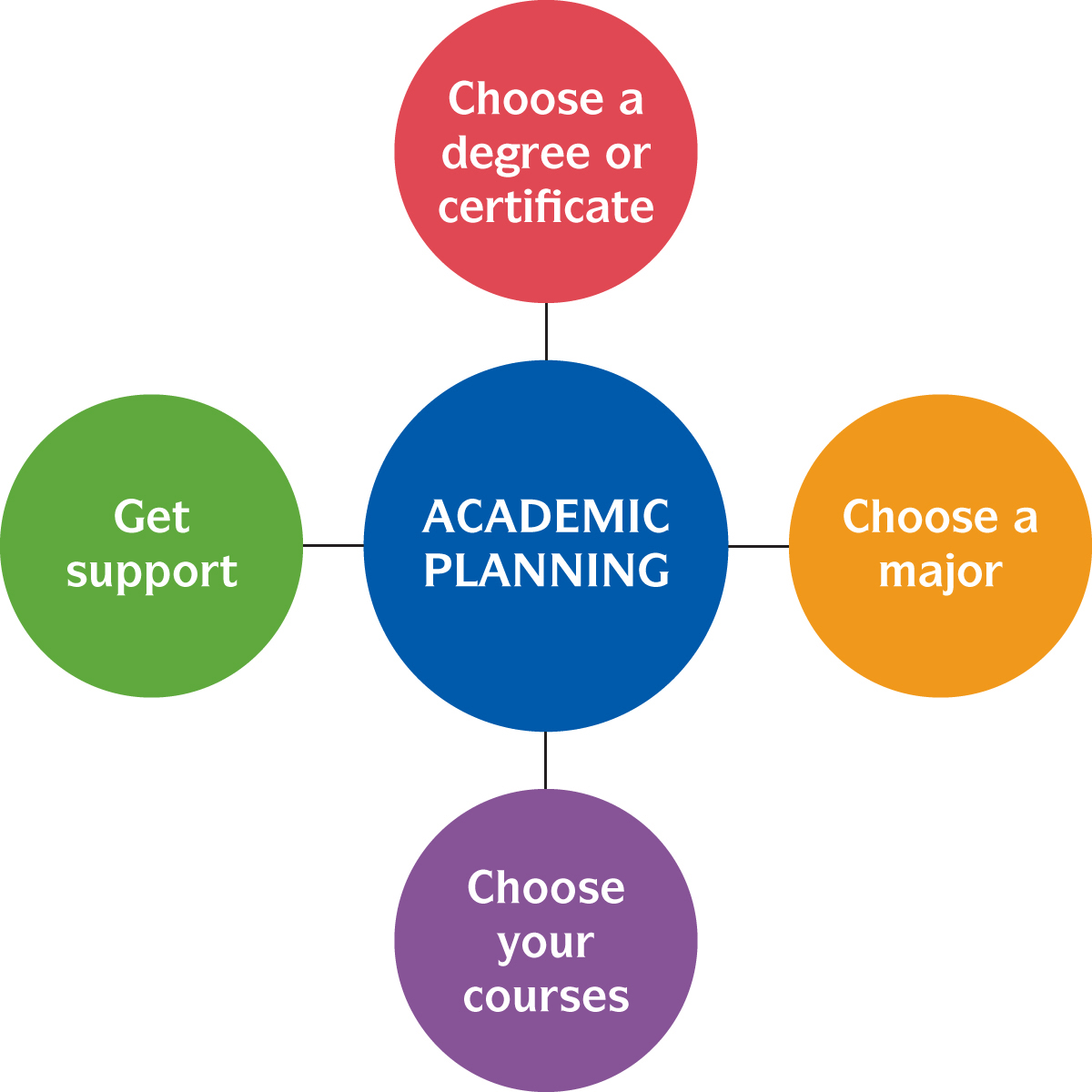Develop an Academic Plan

In college it’s never too early to create an academic plan — a roadmap showing the steps you’ll take to complete your degree or certificate. Recognizing your interests, values, and skills can help you create this plan, as can a solid understanding of your school’s requirements — for instance, when you have to declare a major, the grade point average you need to be accepted into your chosen program, and whether you should document your plan electronically or on paper. To build your plan most effectively, you’ll have to know what’s expected — and when.
Academic Plan: A tool used by students and their advisers to plan and track a student’s progress toward obtaining a degree or certificate.
Your plan will also need to reflect your goals. For example, if you’re attending a two-year college and you want to earn a four-year degree, it’s crucial to determine which of your current classes will transfer to your next institution. And if you’re attending school and want to get a job right after graduation, you’ll focus on courses needed to obtain your degree and prepare for the job market.
Students have unique goals and schools have unique requirements, so your academic plan will likely differ from classmates’ and those of students attending other types of institutions. This puts you in control — it’s your academic plan, you own it, and you can make sure it works for you. If the idea of making these kinds of decisions right now seems overwhelming, trust that your critical thinking skills can help you gather, evaluate, and use the information to make good choices, and that many people at your school can help you do so. Your plan may change in the future, but developing a roadmap early gives you some initial clarity on your academic goals so that you can begin working to achieve them.
To get started on your plan, learn the basics: information about degree options, picking a major, and selecting courses, as well as the benefits of seeking support from an adviser (see Figure 13.1).
Choose a Degree or Certificate
To choose a degree or certificate you have to know your options — and there are many! Schools across the country offer a wide range of degrees and certificates; Table 13.1 shows common examples. Generally, two-year colleges offer different types of degrees than do four-year colleges, though not always. For instance, some colleges that traditionally offered only two-year degrees now offer four-year bachelor’s degrees in high-demand fields. And some four-year schools offer select two-year degrees.
ACTIVITY: Invite the class to use the organizational skills they learned from the chapter on organization and time management to start a file folder, Dropbox, or flash drive on which they can store the information they gather for their academic plan. That way, they can quickly retrieve any information they’ll need in the future.
As you research the options at your school, pay attention to terminology. For example, your school may use different terms to describe associate’s degrees that prepare you to transfer to a four-year college and associate’s degrees that prepare you to enter the workforce directly.
In addition, remember that everyone’s life circumstances are unique. Not all students graduate in exactly two or four years, even if they attend what’s considered a two- or four-year school. For example, your time line may be different if you’re going to school part-time (as do 37 percent of U.S. students3) or if you take foundational courses before you begin earning college credit. You can work with a professional adviser at your school to decide on a time frame and a degree or certificate program that make sense for you.
| Degree | Time required* | Schools offering degree | General purpose | Sample academic programs |
|---|---|---|---|---|
| Certificates | 1–2 years | Two-year colleges, some four-year institutions, and specialty institutions | Prepare students with specialized skills for work | Automotive maintenance, construction technology, practical nursing, medical assisting |
| Associate of arts, associate of science, associate of applied science | 2 years | Two-year colleges and some four-year institutions | Prepare students for work or for transfer to four-year colleges | Fire science, emergency medical technology, sports and fitness management, early childhood education, visual and performing arts, science, computer science |
| Bachelor of arts, bachelor of science | 4 years | Four-year institutions and some two-year colleges | Prepare students for work or postgraduate education | Physics, psychology, literature, engineering, nursing, history, mathematics, dance, business, foreign languages |
| Master’s degree | 1–3 years (depending on degree type) | Four-year institutions and some specialty institutions | Prepare students for entry into fields requiring advanced training | Social work, counseling, accounting, business administration, geology, nursing and teaching specialties |
| Doctoral degree | 3–6 years (depending on degree type) | Universities and some specialty institutions | Prepare students for entry into fields requiring a doctoral degree for teaching, research, or practice | School or university administration, psychology, science, pharmacy, physical therapy |
| Professional degree | 3–5 years (depending on degree type) | Universities and some specialty institutions | Prepare students for entry into fields requiring advanced training for practice | Medicine (all specialties), law, chiropractic, audiology, veterinary, podiatry, optometry |
| *Note: Times listed to complete degrees are minimum times. Some students take longer, depending on their life circumstances. | ||||
Choose a Major
A college major is a collection of courses organized around an academic theme. A major enables you to understand one area of scholarship or practice in depth. To select a major, you need to consider your own career goals and what’s important to you and to understand some logistics — for example, by when your college expects you to make this decision.
College Major: A collection of courses organized around an academic theme.
Consider Your Career Goals and What’s Important to You. If you have a particular career in mind, investigate what type of degree is generally required and whether that career requires a specific major. To enter fields such as nursing, engineering, education, and accounting, graduating with a pre-professional major is critical. And many academic programs in two-year colleges prepare you for immediate entry into a specific career, such as electrical technician, diesel mechanic, dental hygienist, and certified nursing assistant.
ACTIVITY: Ask students to list three jobs that interest them and to find out which of the degrees in Table 13.1 would be necessary for each job. Then have them research which majors would prepare them for the jobs they’ve identified. Finally, ask students to prepare a broad outline of what steps they’d need to take, starting now, to obtain those jobs.
But other majors — such as sociology, English, psychology, and history — prepare you for a variety of careers by helping you build transferable skills valued by many employers. If your career of choice doesn’t require a specific major, you can select a major based on other factors — for example, because of a class you enjoyed, because of your interests, or because you’re skilled in a particular area (such as music or math).
As you weigh your options, it’s also worth considering whether the career you have in mind calls for advanced schooling. Some careers (for example, doctor, lawyer, or school counselor) require a graduate or professional degree, so if you’re planning to enter one of these fields, investigate whether related graduate programs recommend or require specific undergraduate majors. And if you’re at a two-year school and plan to transfer to a four-year school, selecting certain majors may increase your chance of transferring, especially if you want to enter a specific program.
FOR DISCUSSION: Many students choose majors because they like the subject. Others choose majors based on the job they want. As a class, discuss the pros and cons of each approach.

Consider Time Frame and Qualifications. Many first-year students are undecided about which major to pursue, and that’s okay — most schools have resources that can help students explore different academic and career pathways. However, you’ll want to find out by when your school requires that decision to be made, so you can prepare yourself as best as possible.
ACTIVITY: Invite students struggling to choose a major to read specific course descriptions in the course catalog. Which courses stood out? Which courses excited them? Which majors are associated with these courses?
In addition, you need to know your school’s requirements for being admitted into a particular major so that you can plan how to meet those requirements. Take Nicolai, a first-year student attending a local two-year college. Nicolai wants to go into business and plans to transfer to a four-year college to complete his business degree. He knows that most business programs require a GPA of at least 3.3 to be admitted, but his current GPA is only 3.1. So he talks with his adviser about how he can improve his GPA (for example, he might go for tutoring) and discusses other options to pursue if he’s unsuccessful in doing so.
CONNECT
TO MY CLASSES
Consider the courses you’re taking this term. Write down which courses satisfy your college’s general-education requirements and which, if any, you’re taking in your major.
Choose Your Courses
Depending on your school and program, you’ll need a certain number of credits to graduate, and those credits usually come from two areas: courses required for your major and general-education (or core) course requirements.
To complete your major, certain courses will be required. For instance, if you major in outdoor education, you may have to take courses in teaching methods, child and adult development, and biology. Most majors also allow you to take electives — courses you choose to take based on your interests or career goals. If you’re majoring in architecture, for example, you may decide to take electives in urban planning and art history.
General-education courses, which are common at both two- and four-year colleges, give students a broad liberal education in the natural and social sciences, humanities, arts, and mathematics. These courses are important because they help you develop critical thinking skills, use and evaluate data and numbers, and communicate through writing and speaking — all transferable skills. General-education courses also introduce you to a wide range of ideas and topics. Exposure to new knowledge can help you gain insight into your interests and values — which in turn can help you pick a major. In fact, you might find that you enjoy a course in your general-education curriculum so much that you end up selecting that area as a major.
General-Education Courses: A set of course requirements that gives all students a broad liberal education in the natural and social sciences, humanities, arts, and mathematics.
Conveniently, sometimes you can satisfy general-education course requirements by taking courses related to your major (such as an architecture major who takes an art course). An adviser can strategize with you about which general-education courses will help prepare you for a particular career.
Get Help from an Academic Adviser or Counselor
As you can see, academic planning involves working with a lot of information. To make sure you’re aware of everything you need to know, you’ll want to meet with an academic adviser or, in some states, a counselor — a highly trained professional who can help you make effective academic decisions and refer you to valuable campus resources. Although ultimately you’re responsible for your own academic plan, an adviser can provide the support and information you need to think critically about your options. He or she can also help you stay informed about your school’s course, transfer, and degree requirements.
Academic Adviser/Counselor: A highly trained professional who can help you make effective academic decisions and refer you to valuable campus resources.
There are many types of advisers, and schools organize their advising programs in different ways. For example, some schools have a central academic advising office that specializes in working with first-year students, while at other schools this work is done in counseling centers. And in some cases, academic departments have advisers (some of whom are faculty members) who specialize in working with students who have declared a major.
CONNECT
TO MY RESOURCES
Write down four questions you’d like to ask an adviser when you meet. If you’ve already met, write down three things you learned during that visit about creating an academic plan.
Given the variety in how academic advising is structured, investigate your school’s approach and find out which advisers are responsible for helping you right now. Schedule an appointment with an adviser at least once each term (including this term, if you haven’t done so already) to assess your progress toward your academic goals, to get ideas for overcoming any challenges you encounter, and to refine your academic plan as needed.
voices of experience: student
SELECTING A MAJOR
AND CHOOSING CLASSES

| NAME: | Tony Kao |
| SCHOOL: | University of Kentucky |
| MAJOR: | Mechanical Engineering |
| CAREER GOAL: | Mechanical Design |
“I’ve tried to find elective courses that will not only fulfill requirements but also be useful in my career or daily life.”
I’m a first-generation college student. My parents immigrated to the United States so I could get a better education. It was always assumed that I would go to college, and my parents and advisers have supported me throughout the process. I want to find a career path that I’ll enjoy, but also one that will make them proud.
The people who know me can tell you that I’m a very logical and analytical kind of person. I always like to figure out how things work and how each component of a product contributes to the overall design, regardless of what it is. I thought that since I enjoy learning about how things work, why not make a career of it? I could continue to learn, put my own knowledge to the test, and get paid for doing something I love and enjoy.
Because of this passion and because of my aptitude in math and science, I chose mechanical engineering as my major. This degree will allow me to be creative but also develop my technical skills and knowledge. For example, I recently completed an internship in an automobile assembly plant, which taught me the importance of product reliability, construction, and installation.
My university also has general-education requirements. I’ve tried to find elective courses that will not only fulfill requirements but also be useful in my career or daily life. I chose Technical Writing and Personal Finance. I think these courses will apply no matter what job I get after graduating. I also wanted to take a course that was fun, so I enrolled in a tennis class. I really enjoy this class, and it gives me a break between my engineering classes.
I hope to find a job that will provide me with financial stability, the potential for growth, and fulfillment. I want a sense of pride from the work that I do.
YOUR TURN: Have you chosen a major? If so, how does the process you used to select your major compare with the one that Tony used to select his? If your school offers electives, do any appeal to you? If so, which ones — and why?